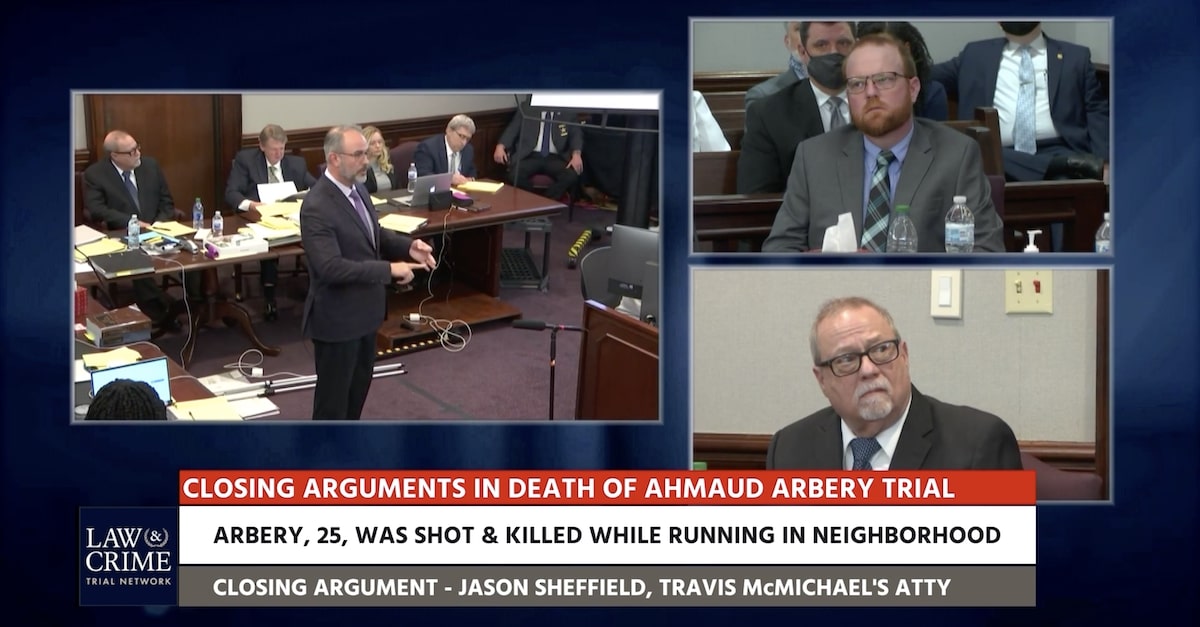
An attorney for the man who fatally shot Ahmaud Arbery questioned the premise that the alleged victim had been jogging in the neighborhood where he was killed on Feb. 23, 2020, attempting to undermine the public’s predominating view of what happened on that day.
“There is no evidence that Ahmaud Arbery jogged or exercised in Satilla Shores, not one friend, one family member, not one eyewitness,” Travis McMichael’s attorney Jason Sheffield told jurors during summations on Monday.
“There is no evidence whatsoever that Satilla Shores was a place for exercise for Ahmaud Arbery,” he added.
During opening statements, Cobb County Assistant District Attorney Linda Dunikoski said that Arbery’s passion for running—corroborated by his family—was evident from the fact that the tread was worn from his Nike shoes.
The description of Arbery as a jogger supported the prosecution’s argument that the case of his alleged murder is one about “assumptions and driveway decisions”—namely, that McMichael, his father Greg McMichael, and William “Roddie” Bryan jumped to a fast and erroneous conclusion when they saw the 25-year-old Black man in their neighborhood.
Before the day of his death, Arbery had been spotted on surveillance footage inside the construction site of a Brunswick, Ga. house owned by local homeowner Larry English. Residents of the community had reported crime in the Satilla Shores neighborhood, including thefts of belongings from English’s boat and a gun from Travis McMichael’s unlocked truck.
Neither of the parties asserted any evidence tying Arbery to either crime, and English testified that he never authorized the McMichaels and Bryan to confront people on his property.
During opening statements, a different attorney for Travis McMichael framed the case as one about his client’s “duty and responsibility” to his community. The three men claim to have had probable cause to suspect Arbery of a burglary and wanted to execute a citizen’s arrest.
Defense summations followed the same template, adding a refrain that sometimes “duty and responsibility” is “intertwined with heartache and tragedy.” McMichael’s lawyer depicted his client’s actions as an unanticipated escalation of his effort to hold Arbery long enough for the authorities. He argued that his client was right to be suspicious when Arbery ran away from the property and would not speak to him.
Once Arbery was cornered, Sheffield said, the 25-year-old reached for McMichael’s firearm.
“Is there any question that Mr. Arbery had his hand on his firearm, any question at all?” Sheffield asked, answering later: “There is no question that Ahmaud’s hands are on this gun.”
When Travis McMichael took the witness stand, he described killing Arbery as the “most traumatic” experience of his life and said he was distraught after the fatal confrontation. His attorney said that this is not the popular image of his client.
“If this were a case about wanting to murder a Black jogger, Travis [McMichael] would not have reacted like that,” Sheffield said.
Defense summations fell shortly after the prosecution systematically tore into the citizen’s arrest claims. A citizen’s arrest, prosecutors noted, only can be effectuated when a felony is committed in front of you or takes place within your immediate knowledge. For the latter, Dunikoski compared immediate knowledge to a person watching security camera footage in real time at Walmart and seeing an offense occur. Prosecutor Dunikoski said that Arbery was a “lookie-loo” on English’s property—a misdemeanor, at most, she said. Glynn County police Officer Robert Rash testified during the trial that he would have let off Arbery with a warning.
The McMichaels had only “speculation” to suspect burglary, the more serious offense required for such an arrest, Dunikoski added.
As the state has the burden of proof in criminal trials, the prosecution will have rebuttal summations after the other defendants’ summations conclude.
(Photo via Law&Crime Network)